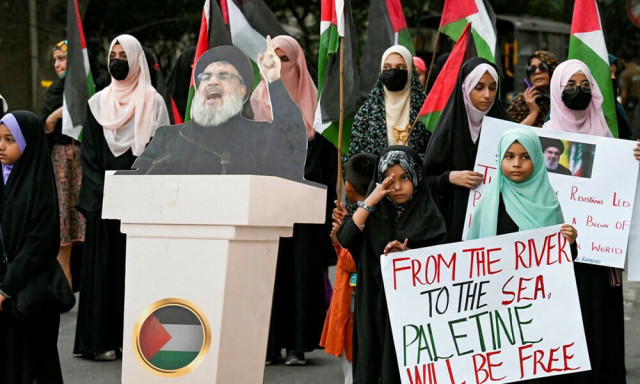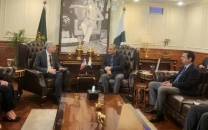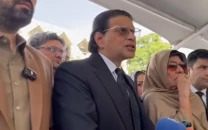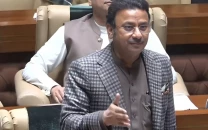Protests follow Nasrallah's death
Around 4,000 people gathered in Islamabad and 3,000 thousand in Karachi during rallies and prayers for Nasrallah.

Thousands of people protested in several cities on Sunday after Hezbollah confirmed that its longtime chief had been killed by an Israeli air strike in Lebanon.
Around 4,000 people gathered in Islamabad and 3,000 thousand in Karachi during rallies and funeral prayers for Nasrallah.
Hezbollah said on Saturday that Hassan Nasrallah was killed in the strike on Beirut's southern suburbs a day earlier, dealing a massive blow to the group he had led for decades.
"We stand against what Israel is doing in Palestine and Lebanon, this is why we are here today," 27-year-old Taskeen Zafar said during the rally in Islamabad.
The killing of Nasrallah marked a sharp escalation in nearly a year of cross-border fire between Hezbollah and Israel, and risks plunging the wider region into war.
"Pakistan strongly condemns the growing Israeli adventurism in the Middle East," Pakistan's Ministry of Foreign Affairs said in a statement on Sunday.
"Yesterday's reckless act of killing the Secretary General of Hezbollah in Lebanon constitutes a major escalation in an already volatile region."
Hezbollah began low-intensity cross-border strikes on Israeli troops a day after its Palestinian ally Hamas staged an unprecedented attack on Israel on October 7.
Nearly a year later, Israel announced a shift in focus to battling Hezbollah on its northern front.
Hamas's October 7 attack resulted in the deaths of 1,205 people, mostly civilians, according to an AFP tally based on Israeli official figures that include hostages killed in captivity.
Israel's retaliatory military offensive has killed at least 41,595 people in Gaza, most of them civilians, according to figures from the Gaza health ministry. The UN has described the figures as reliable.
In a related development, religious groups held a protest rally from Karachi's Numaish Chowrangi to the US Consulate in Karachi under the banner of "Supporters of Palestine" to condemn the assassination of Hezbollah leader Syed Hassan Nasrallah.
The rally, led by Allama Hassan Zafar Naqvi of Majlis Wahdat-e-Muslimeen (MWM), saw a large turnout of people from various walks of life, including scholars, youth, elders, women, and children.
Participants carried banners with slogans against the US and Israel, expressing their outrage over the killing.
As the demonstrators attempted to march toward the US Consulate, they tried to bypass barricades by crossing containers placed by the authorities, prompting a strong response from the police, who resorted to intense tear gas shelling and baton charges.
In retaliation, protesters hurled stones at the police, turning the area into a battlefield for nearly an hour.
When demonstrators attempted to remove the barricades, the police responded with more force, leading to injuries among the protesters.



















COMMENTS
Comments are moderated and generally will be posted if they are on-topic and not abusive.
For more information, please see our Comments FAQ